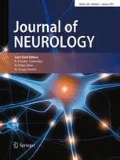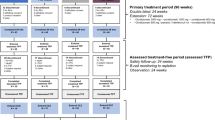Abstract
Background and objective
Long–term observational studies may provide additional information about the behaviour of different drugs in the post–marketing period. We present the data of our cohort of relapsing–remitting multiple sclerosis (RRMS) patients treated with interferon beta (IFNβ).
Methods
We analysed RRMS patients followed for at least 2 years. From 1995, we initiated therapy with IFNβ.As they became available, patients were allocated to one of the IFNs at standard doses (IFNβ–1b, IFNβ–1a i. m. or IFNβ–1a s. c.). Each patient was included in a follow–up protocol containing demographic and baseline clinical data.
Results
Between 1995 and 2004, 382 patients have completed at least 2 years of follow–up. Significant differences at entry were observed. Patients on IFNβ–1b had a higher disease activity and disability at baseline than those on IFNβ–1a i. m. or IFNβ–1a s. c. A significant reduction in the relapse rate was observed for the three drugs (70 % for IFNβ–1b, 64% for IFNβ–1a i. m. and 74 % for IFNβ–1a s. c.). We observed a sustained progression of disability in 11% of patients on IFNβ–1b, 17% on IFNβ–1a i. m. and 19% on IFNβ–1a s. c.; and at four years of follow–up in 24% of patients on IFNβ–1b, 23% on IFNβ–1a i. m. and 35% on IFNβ–1a s. c. No unexpected major adverse events were observed with any of the drugs.
Conclusions
Interferon beta is safe and well tolerated. The various registered interferon beta drugs provide a comparable efficacy in a large non–selected cohort of RRMS patients.
Similar content being viewed by others
References
The IFNB Multiple Sclerosis Study Group (1993) Interferon beta-1b is effective in relapsing-remitting multiple sclerosis. I. Clinical results of a multicenter, randomized, doubleblind, placebo-controlled trial. Neurology 43:655–661
Jacobs LD, Cookfair DL, Rudick RA, Herndon RM, et al. (1996) Intramuscular interferon β-1a for disease progression in relapsing multiple sclerosis. Ann Neurol 39:285–294
PRIMS Study Group (1998) Randomised double-blind placebo-controlled study of interferon β-1a in relapsing-remitting multiple sclerosis. Lancet 352:1498–1504
Paty DW, Li DK, for the University of British Columbia MS/MRI Study Group and the IFNβ Multiple Sclerosis Study Group (1993) Interferon beta-1b is effective in relapsing-remitting multiple sclerosis. II. MRI analysis results of a multicenter, randomized, doubleblind, placebo-controlled trial. Neurology 43:662–667
Simon JH, Jacobs LD, Campion M, et al. for the Multiple Sclerosis Collaborative Research Group (1998) Magnetic Resonance studies of intramuscular interferon β-1a for the relapsing multiple sclerosis. Ann Neurol 43:79–87
Li DK, Paty DW (1999) Magnetic resonance imaging results of the PRISMS trial: a randomized, double-blind, placebo-controlled study of interferon- β1a in relapsing-remitting multiple sclerosis. Ann Neurol 46:197–206
Durelli L, Verdun E, Barbero P, et al. (2002) Every-other-day interferon beta-1b versus once-weekly interferon beta-1a for multiple sclerosis: Results of a 2-year prospective randomised multicentre study (INCOMIN). Lancet 359:1453–1460
Panitch H, Goodin DS, Francis G, et al. EVIDENCE Study Group (2002) Randomized, comparative study of interferon beta-1a treatment regimens in MS: The EVIDENCE Trial. Neurology 59:1496–1506
Clanet M, Radue EW, Kappos L, et al. (2002) A randomized, double-blind, dose-comparison study of weekly interferon beta-1a in relapsing MS. Neurology 59:1507–1517
Noseworthy J, O’Brien P, Erickson BJ, Lee D, et al. (1998) The Mayo Clinic Canadian-Cooperative Trial of Sulfasalazine in active multiple sclerosis. Neurology 51:1342–1352
Rio J, Nos C, Tintore M, et al. (2002) Assessment of different treatment failure criteria in a cohort of relapsingremitting MS patients treated with interferon beta. Implications for clinical trials. Ann Neurol 52:400–406
Wingerchuk DM, Noseworthy JH (2002) Randomized controlled trials to assess therapies for multiple sclerosis. Neurology 58(8 Suppl 4):S40–S48
Poser CM, Paty DW, Scheinberg L, McDonald WI, et al. (1983) New diagnostic criteria for multiple sclerosis: guidelines for research protocols. Ann Neurol 13:227–231
Benson K, Arthur HJ (2000) A comparison of observational studies and randomized controlled trials. N Eng J Med 342:1878–1886
Concato J, Shah N, Horowitz RI (2000) Randomized, controlled trials, observational studies, and the hierarchy of research designs. N Engl J Med 342:1887–1892
Pocock SJ, Elbourne DR (2000) Randomized trials or observational tribulations? N Engl J Med 342:1907–1909
Interferon beta-1b in the treatment of multiple sclerosis: final outcome of the randomized controlled trial (1995) The IFNB Multiple Sclerosis Study Group and The University of British Columbia MS/MRI Analysis Group. Neurology 45:1277–1285
PRISMS Study Group and the University of British Columbia MS/MRI Analysis Group (2001) PRISMS-4: Long-term efficacy of interferon-β-1a in relapsing MS. Neurology 56: 1628–1636
Trojano M, Liguori M, Paolicelli D, et al. (2003) Interferon beta in relapsing- remitting multiple sclerosis: an independent postmarketing study in southern Italy. Mult Scler 9:451–457
Waubant E, Vukosic S, Gignoux L, et al. (2003) Clinical characteristics of responders to interferon therapy for relapsing MS. Neurology 61:184–189
Dubois BD, Keenan E, Porter BE, et al. (2003) Interferon beta in multiple sclerosis: experience in a British specialist multiple sclerosis centre. J Neurol Neurosurg Psychiatry 74:946–949
Weinshenker BG, Ebers GC (1987) The natural history of multiple sclerosis. Can J Neurol Sci 14:255–261
Goodin DS (2003) Interferons in relapsing remitting multiple sclerosis. Lancet 361:1821
Malucchi S, Sala A, Gilli F, et al. (2004) Neutralizing antibodies reduce the efficacy of IFNβ during treatment of multiple sclerosis. Neurology 62: 2031–2037
Author information
Authors and Affiliations
Corresponding author
Rights and permissions
About this article
Cite this article
Río, ., Tintoré, M., Nos, C. et al. Interferon beta in relapsing–remitting multiple sclerosis. J Neurol 252, 795–800 (2005). https://doi.org/10.1007/s00415-005-0748-5
Received:
Revised:
Accepted:
Published:
Issue Date:
DOI: https://doi.org/10.1007/s00415-005-0748-5




